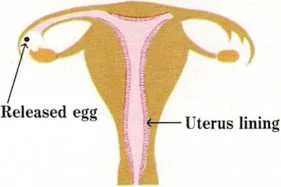Menstruation
Menstruation. All parents who have a daughter want her to grow up
enjoying her femininity. It follows that all girls should learn to
accept menstruation as a normal part of growing up, essential to the
process of reproduction.
Unfortunately, some girls fear menstrual periods and become emotionally
upset when they begin the process. They may have heard their mothers or
their friends refer to menstruation as “having the curse” or “being
sick.” Or they may have been told that menstruation is painful; that
they will feel weak; or that they cannot exercise, dance, swim, take
baths, or wash their hair.
When a girl becomes about 8 years old—or earlier if she asks
questions—her mother should start to tell her about menstruation.
Present it to her as the special phenomenon it is—preparation for the
wonderful day when she is to be a mother.
Begin by telling your daughter about the two ovaries, one on either side
of her uterus (womb), and about the vagina. The ovaries
produce eggs capable of developing into babies if they are fertilized by
sperm. The uterus is the special place in the mother’s body where the
baby will grow until it is ready to be born. It is a pear-shaped organ
in the middle of a woman’s body. The vagina is the birth canal, through
which the baby is born. It is below the uterus.
Menstrual cycle. Once a girl enters puberty, generally by the time
she is 11 or 12, the ovaries start to produce one egg a month. This egg
is smaller than the head of a pin. About two weeks after menstruation,
the egg passes from the ovary through a tube, called the Fallopian tube,
to the uterus. The uterus prepares itself in case the egg is fertilized.
If a baby is going to grow from this tiny egg, it must receive food.
This food is brought to the uterus in the mother’s blood. The lining of
the uterus becomes thick and spongy to receive the egg and help feed it.
If the egg is not going to develop into a baby, this lining is not
needed. The lining breaks down, and most of the lining and a little
blood pass out of the body through the vagina. This discharge occurs
about once a month unless a woman is pregnant. Menstrual periods do not
occur during pregnancy and for a month or so afterward.
Some girls associate bleeding with injury and are frightened by the
thought of menstrual bleeding. The amount of blood discharged during
menstruation varies with the individual. It is usually about HA ounces
(44.5 milliliters), not enough to make a girl anemic or weaken her. The
body quickly replaces this small amount of blood.
Reassure your daughter that an irregular menstrual cycle is not uncommon
for the first couple of years. There may even be lapses of two or three
months between periods. After that the cycle should recur every 26 to 30
days, each period usually lasting about 5 days.
The cycle, once established, is fairly regular for each girl, but it may
occasionally vary. Excitement or nervousness may cause irregularity.
Many girls skip menstrual periods when a great change in their normal
routine occurs—for example, when they are away at summer camp or
during their first year at college. Menstrual periods may also
stop in girls who have lost a considerable amount of weight or who
engage in constant strenuous activities such as running marathons or
seriously studying ballet.
Care during the period. During the menstrual period, some girls use
soft, absorbent, gauze pads called sanitary napkins to absorb the
menstrual flow. The pads are held in place in the underpants by adhesive
strips on the back of the pads. Other girls use tampons—small rolls of
compressed, absorbent material that are inserted into the vagina. If
tampons are to be used, they should be changed every four to six hours.
Hands should be washed before inserting the tampon, and an applicator
should be used. Sanitary pads should be worn at night.
Some girls worry about offensive odors that may occur during
menstruation. These odors result not from the freshly discharged blood
but from changes in the blood as it dries. Frequent changing of sanitary
pads or tampons provides greater comfort and less concern about personal
hygiene.
Many girls ask if menstruation will hurt. Pain or discomfort does not
necessarily ac
The menstrual cycle
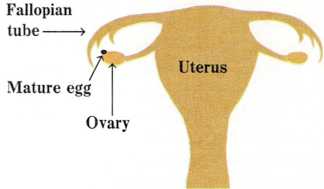
1. Although each ovary may contain thousands of potential eggs,
usually only one egg matures during each cycle.
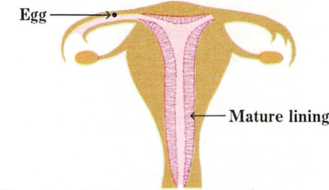
3. The egg slowly moves down the Fallopian tube to the uterus.
Fertilization, if it occurs, takes place in the Fallopian tube.
company menstruation. Some girls get cramps, but the cramps usually last
only the first few days. Most cramps can be relieved by medication, a
hot-water bottle, a heating pad, and warm drinks. But if the pain is too
severe, consult a doctor. Tenderness of the breasts, backache, a feeling
of heaviness, and a slight gain in weight may also accompany the
menstrual period.
A girl usually can continue her normal activities during her menstrual
periods. She may dance, skate, and ski; and she may wash her hair and
take showers. If tampons are used, a girl may swim at any time during
her period.
What to tell boys. Boys, too, ask questions about menstruation. “Do
boys menstruate?” “Does it hurt?” These questions should be answered
truthfully. Explain to them that menstruation is simply a process of
getting rid of material that was ready inside the body with food for a
baby. Since men cannot have babies inside of them, men do not
menstruate. Tell them also that menstruation does not usually hurt. Some
girls are uncomfortable and may be a little cross,
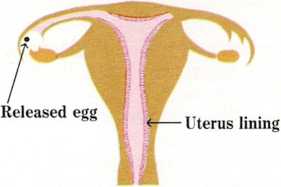
2. The ovary releases the mature egg. The lining of the uterus starts
growing to receive and feed the egg if it is fertilized.
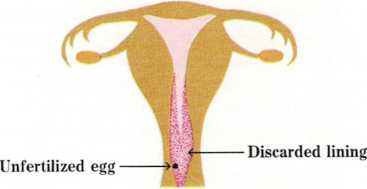
4. If the egg is not fertilized, the lining of the uterus is not
needed. The lining breaks down and passes out of the body.
but they go right ahead with school or work or whatever they have to do.
Reassure them that menstruation is not like bleeding from an injury,
[m.g.]

